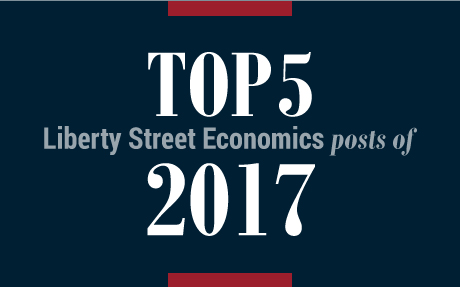How Do the Fed’s MBS Holdings Affect the Economy?

In our previous post, we discussed the meaning of the term “credit allocation” and how it relates to the Federal Reserve’s holdings of agency mortgage-backed securities (MBS). We concluded that the Fed’s MBS holdings do not pose significant credit risk but that the Fed does influence the relative market price of credit when it purchases agency MBS, and this indirectly influences decisions by investors. Today, we take the next step and discuss how the Fed’s MBS purchases affect the U.S. economy and, in particular, how the effect of MBS purchases can differ from the effect of purchases of Treasury securities.
How Do the Fed’s MBS Purchases Affect Credit Allocation?

It is sometimes said that the Federal Reserve should not engage in “credit allocation.” But what does credit allocation actually mean? And how do current Fed policies affect the allocation of credit? In this post, we describe two separate ideas often associated with credit allocation. The first idea is that the Fed should not take credit risk, which taxpayers would ultimately have to bear. The second idea is that the Fed’s actions should not influence the flow of credit to particular sectors. We consider whether the Fed’s holdings of agency mortgage-backed securities (MBS) could affect the allocation of credit. In a companion post, we discuss how the economic effects of the Fed’s MBS holdings compare with the economic effects of more traditional holdings.
Hey, Economist! Outgoing New York Fed President Bill Dudley on FOMC Preparation and Thinking Like an Economist

Bill Dudley will soon turn over the keys to the vault—so to speak. But before his tenure in office ends after nine years as president of the New York Fed, Liberty Street Economics caught up with him to capture his parting reflections on economic research, FOMC preparation, and leadership. Publications editor Trevor Delaney recently caught up with Dudley.
The ‘Banking Desert’ Mirage

Donald P. Morgan, Maxim L. Pinkovskiy, and Davy Perlman Editor’s note: The original version of this post misstated the share of the population that is unbanked for several states. The table, interactive chart, and related text have been corrected. These changes did not alter our conclusion that across states, the share of the population that […]
Fiscal Implications of the Federal Reserve’s Balance Sheet Normalization

In the wake of the global financial crisis, the Federal Reserve dramatically increased the size of its balance sheet—from about $900 billion at the end of 2007 to about $4.5 trillion today. At its September 2017 meeting, the Federal Open Market Committee (FOMC) announced that—effective October 2017—it would initiate the balance sheet normalization program described in the June 2017 addendum to the FOMC’s Policy Normalization Principles and Plans.
The Fed’s Balance Sheet, Night Lights, and the Other Top LSE Posts of 2017

In the spirit of this season of year-end lists of accomplishments, Liberty Street Economics offers a roundup of our most viewed posts. Our readers continued to gravitate toward timely, topical posts; our most popular explained how the Fed manages its enlarged balance sheet—a major focus of the FOMC, Congress, markets, and economists. Prompted by reader questions in response to their first post, the authors also penned a follow-up post. Another hit this year described an innovative indicator of economic growth—night light intensity measured via satellite—and used it to fact-check official Chinese growth estimates.
Just Released: New York Fed Markets Data Dashboard
The Federal Reserve Bank of New York releases data on a number of market operations, reference rates, monetary policy expectations, and Federal Reserve securities portfolio holdings. These data are released at different times, for different types of securities or rates, and for different audiences.
Hey, Economist! Tell Us about Your First Year as Research Director of the New York Fed

An Interview with Beverly Hirtle A year has passed since Beverly Hirtle was named director of research for the Federal Reserve Bank of New York. Before assuming that position, Bev played many roles at the Bank over the last thirty years, including serving as the deputy chair of the Federal Reserve Model Oversight Group responsible […]
Why Pay Interest on Excess Reserve Balances?

In a previous post, we described some reasons why it is beneficial to pay interest on required reserve balances. Here we turn to arguments in favor of paying interest on excess reserve balances. Former Federal Reserve Chairman Ben Bernanke and former Vice Chairman Donald Kohn recently discussed many potential benefits of paying interest on excess reserve balances and some common misunderstandings, including that paying interest on reserves restricts bank lending and provides a subsidy to banks. In this post, we focus primarily on benefits related to the efficiency of the payment system and the reduction in the need for the provision of credit by the Fed when operating in a framework of abundant reserves.
Why Pay Interest on Required Reserve Balances?

The Federal Reserve has paid interest on reserves held by banks in their Fed accounts since 2008. Why should it do so? Here, we describe some benefits of paying interest on required reserve balances. Since forcing banks to hold unremunerated reserves would be akin to levying a tax on them, paying interest on these balances is a way to eliminate or greatly reduce that tax and its negative effects.











 RSS Feed
RSS Feed Follow Liberty Street Economics
Follow Liberty Street Economics